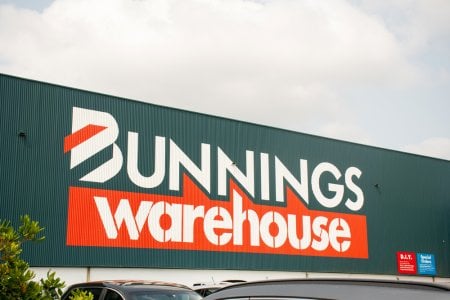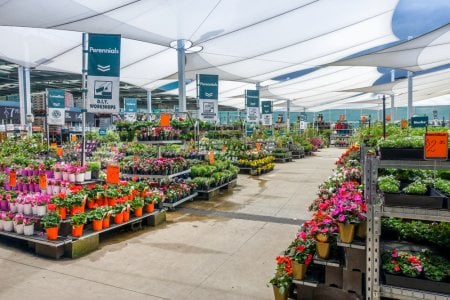‘Treated as slaves’: Plant suppliers expose how Bunnings ‘wound their business into the dirt’
By
Seia Ibanez
- Replies 8
The iconic Australian hardware giant Bunnings, known for its vast selection of home improvement goods, has recently come under fire for its treatment of plant suppliers.
Allegations have surfaced suggesting that Bunnings, owned by the ASX-listed conglomerate Wesfarmers, may be using its market power to impose unfair and unprofitable contracts on nurseries.
The issue emerged as suppliers spoke out about the stress and financial strain they have endured while under contract with Bunnings.
Some nursery owners have reported that the pressure from these contracts had been so intense that it has put their businesses at risk and left them feeling like 'slaves' and 'serfs' to the retail behemoth.

With Bunnings' first store opening in 1994 and now boasting over 300 stores nationwide, the company's influence on the plant and garden market is undeniable.
Despite Bunnings claiming that its plant sales share is closer to 25 per cent, data from IBISWorld indicates that Wesfarmers controls 43.3 per cent of the hardware market.
One anonymous supplier, who feared public backlash and potential legal action, said that supplying potted plants to Bunnings was not only unprofitable but sometimes resulted in selling at a loss.
After many years of supplying the retailer, this grower revealed that their small business was earning so little from the contract that they were exempt from paying income tax and could only foresee retirement by selling off their nursery.
‘We have been virtually treated as serfs,’ the nursery owner said.
‘They wound our business into the dirt.’
The supplier agreements have highlighted contentious supply terms, such as 'rebates' that effectively reduce the payment to growers by 15 per cent for stock sold into newly opened stores.
Additionally, some growers were not offered minimum guaranteed orders, leaving them vulnerable and hesitant to negotiate for better prices due to fear of losing business altogether.
‘Bunnings is virtually a protection racket like the mafia,’ the nursery owner said.
‘It's like legalised extortion, and it should not be able to operate in a country like Australia.’
The Senate inquiry into supermarket pricing, which has unexpectedly ensnared Bunnings due to its sale of plants, has become a platform for these grievances to be aired.
During the inquiry, Boomaroo Nurseries, a significant supplier producing 300 million plants annually, announced its decision to terminate its 11-year contract with Bunnings.
The company's CEO, Peter Smith, said, ‘It's been tiring. It's been draining. But it's also been a little bit liberating as well, being able to tell them no, and walk away and watch them get angry and return at us, and make threats because we're leaving.’
‘And there's not a day goes by that any of us regret that decision.’
He also told the Senate that his company had ‘broke even at very best’ with its contract with Bunnings for a decade and ultimately lost $8.5 million in revenue.
‘Every time we requested a price increase, some kind of threat was made to make you feel like you're asking for something that's completely terrible,’ Smith added.
‘So we dropped the price discussion completely for fear of having our prices go down rather than go up.’

The inquiry also heard from Karen Brock, a smaller nursery owner who ceased supplying Bunnings eight years ago due to the detrimental impact on her marriage and business.
‘We felt that we were slaves. We were slaves to Bunnings,’ Brock told the inquiry.
‘It got to the point where our marriage was in deep trouble. Our business was in deep trouble. And our future was in deep trouble.’
‘We have not dealt with Bunnings since 2016. And I have to admit it took four years before we could step into a store.’
Greenlife Industry Australia (GIA), an industry group representing some growers, has been advocating for a mandatory code to protect growers and has published testimonies of former Bunnings suppliers online.
A published account shared that a former grower raised concerns about verbal contracts, below-cost pricing offers, and being forced by Bunnings to use their own freight and logistics company, which made it harder for him to make profits.
In response to the mounting criticism, Bunnings CEO Michael Schneider reached out to growers, urging them to report concerns directly to the company or through its anonymous whistleblower system operated by Deloitte.
‘I've been particularly concerned at the suggestion that some of our suppliers haven't felt safe to raise concerns with us,’ Schneider wrote.
Bunnings has also sought support from suppliers like Haars Nursery, who have had positive experiences and publicly backed the company.
‘Every commitment we get from Bunnings is always in writing,’ Brendan Haars of Haars Nursery said.
‘Our experience is that Bunnings has always taken the product they've committed to take. We've been supplying Bunnings since their first store. It's been a great relationship.’
Bunnings has also opposed the group’s contentions, challenging the accuracy of GIA's claims and the portrayal of its market power.
As the Senate continues to investigate, Bunnings representatives Laura Gaspert, Ethical Sourcing Manager, and Belinda Rakers, Category Manager, were set to respond to the allegations on Monday, 15 April.
However, this isn’t the only issue the hardware giant is facing.
In a previous story, a female employee at Bunnings exposed the rampant sexism she faced.
Her story shed light on the broader issue of gender bias in traditionally male-dominated industries and raised questions about how companies can better support their female employees. You can read more about the story here.
 What do you think about this story, members? Share your thoughts in the comments below.
What do you think about this story, members? Share your thoughts in the comments below.
Allegations have surfaced suggesting that Bunnings, owned by the ASX-listed conglomerate Wesfarmers, may be using its market power to impose unfair and unprofitable contracts on nurseries.
The issue emerged as suppliers spoke out about the stress and financial strain they have endured while under contract with Bunnings.
Some nursery owners have reported that the pressure from these contracts had been so intense that it has put their businesses at risk and left them feeling like 'slaves' and 'serfs' to the retail behemoth.

Plant suppliers exposed the stress they have endured while under contract with Bunnings. Credit: Shutterstock
With Bunnings' first store opening in 1994 and now boasting over 300 stores nationwide, the company's influence on the plant and garden market is undeniable.
Despite Bunnings claiming that its plant sales share is closer to 25 per cent, data from IBISWorld indicates that Wesfarmers controls 43.3 per cent of the hardware market.
One anonymous supplier, who feared public backlash and potential legal action, said that supplying potted plants to Bunnings was not only unprofitable but sometimes resulted in selling at a loss.
After many years of supplying the retailer, this grower revealed that their small business was earning so little from the contract that they were exempt from paying income tax and could only foresee retirement by selling off their nursery.
‘We have been virtually treated as serfs,’ the nursery owner said.
‘They wound our business into the dirt.’
The supplier agreements have highlighted contentious supply terms, such as 'rebates' that effectively reduce the payment to growers by 15 per cent for stock sold into newly opened stores.
Additionally, some growers were not offered minimum guaranteed orders, leaving them vulnerable and hesitant to negotiate for better prices due to fear of losing business altogether.
‘Bunnings is virtually a protection racket like the mafia,’ the nursery owner said.
‘It's like legalised extortion, and it should not be able to operate in a country like Australia.’
The Senate inquiry into supermarket pricing, which has unexpectedly ensnared Bunnings due to its sale of plants, has become a platform for these grievances to be aired.
During the inquiry, Boomaroo Nurseries, a significant supplier producing 300 million plants annually, announced its decision to terminate its 11-year contract with Bunnings.
The company's CEO, Peter Smith, said, ‘It's been tiring. It's been draining. But it's also been a little bit liberating as well, being able to tell them no, and walk away and watch them get angry and return at us, and make threats because we're leaving.’
‘And there's not a day goes by that any of us regret that decision.’
He also told the Senate that his company had ‘broke even at very best’ with its contract with Bunnings for a decade and ultimately lost $8.5 million in revenue.
‘Every time we requested a price increase, some kind of threat was made to make you feel like you're asking for something that's completely terrible,’ Smith added.
‘So we dropped the price discussion completely for fear of having our prices go down rather than go up.’

Many suppliers have ended their contract with Bunnings, and none regretted that decision. Credit: Shutterstock
The inquiry also heard from Karen Brock, a smaller nursery owner who ceased supplying Bunnings eight years ago due to the detrimental impact on her marriage and business.
‘We felt that we were slaves. We were slaves to Bunnings,’ Brock told the inquiry.
‘It got to the point where our marriage was in deep trouble. Our business was in deep trouble. And our future was in deep trouble.’
‘We have not dealt with Bunnings since 2016. And I have to admit it took four years before we could step into a store.’
Greenlife Industry Australia (GIA), an industry group representing some growers, has been advocating for a mandatory code to protect growers and has published testimonies of former Bunnings suppliers online.
A published account shared that a former grower raised concerns about verbal contracts, below-cost pricing offers, and being forced by Bunnings to use their own freight and logistics company, which made it harder for him to make profits.
In response to the mounting criticism, Bunnings CEO Michael Schneider reached out to growers, urging them to report concerns directly to the company or through its anonymous whistleblower system operated by Deloitte.
‘I've been particularly concerned at the suggestion that some of our suppliers haven't felt safe to raise concerns with us,’ Schneider wrote.
Bunnings has also sought support from suppliers like Haars Nursery, who have had positive experiences and publicly backed the company.
‘Every commitment we get from Bunnings is always in writing,’ Brendan Haars of Haars Nursery said.
‘Our experience is that Bunnings has always taken the product they've committed to take. We've been supplying Bunnings since their first store. It's been a great relationship.’
Bunnings has also opposed the group’s contentions, challenging the accuracy of GIA's claims and the portrayal of its market power.
As the Senate continues to investigate, Bunnings representatives Laura Gaspert, Ethical Sourcing Manager, and Belinda Rakers, Category Manager, were set to respond to the allegations on Monday, 15 April.
However, this isn’t the only issue the hardware giant is facing.
In a previous story, a female employee at Bunnings exposed the rampant sexism she faced.
Her story shed light on the broader issue of gender bias in traditionally male-dominated industries and raised questions about how companies can better support their female employees. You can read more about the story here.
Key Takeaways
- Plant suppliers to Bunnings have reported alleged unfair and unprofitable contracts, causing significant distress to business owners.
- Boomaroo Nurseries ended its 11-year contract with Bunnings, citing a lack of profitability and unsustainable supply terms.
- The Senate inquiry into supermarket pricing heard testimony from multiple nursery operators about their experiences with Bunnings, and there are calls for a mandatory code to protect growers.
- Bunnings CEO Michael Schneider has encouraged suppliers to use an anonymous whistleblower system to report concerns, stating that the recent allegations do not align with Bunnings' understanding of their business practices.







